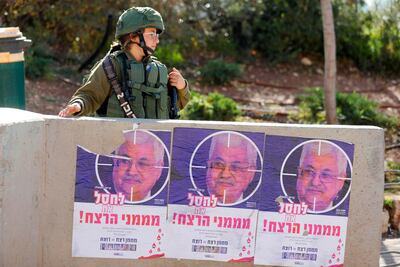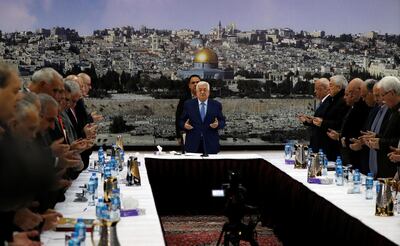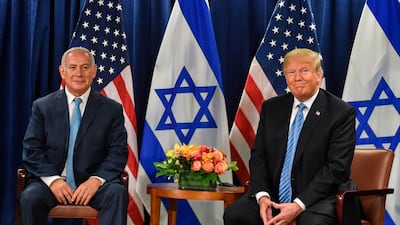In 2017, US President Donald Trump drew the knife on the Palestinian cause and historic US-Palestinian ties. This year he lunged at both, slashing at their very foundations and bloodying them beyond recognition.
After announcing the relocation of the American embassy to Jerusalem in December 2017, the US leader embarked on a series of moves that would deal blow after blow to Palestinian aspirations of a sovereign state side-by-side with Israel.
There is shock in Ramallah at the speed at which Mr Trump reversed decades of US foreign policy and his team’s willingness to broaden the already-wide gap between both sides in the conflict.
He and his key aides – son-in-law Jared Kushner, Middle East envoy Jason Greenblatt, and ambassador to Israel David Friedman – cut all funding to the United Nations agency for Palestinian refugees and slashed aid to East Jerusalem hospitals. They have failed to condemn continued Israeli settlement building in the West Bank and East Jerusalem, widely viewed as illegal under international law.

Most offensive to the Palestinians, the billionaire friend of Mr Netanyahu moved the US embassy to Jerusalem in May, at a ceremony held on the 60th anniversary of the Nakba, the day of catastrophe in which 750,000 Palestinians were displaced at the birth of Israel in 1948.
“Without a doubt relations between the US and the Palestinians have reached a low point, their lowest since at least the Second Intifada when the administration of George W Bush turned its back on then Palestinian president [Yasser] Arafat and stood by as Israel bulldozed his Muqata compound in Ramallah,” says Hugh Lovatt, policy fellow at the European Council on Foreign Relations’ Middle East and North Africa Programme.
“But while ties were fully re-established following Arafat’s death, the damage this time round may be more enduring.”
Palestinians no longer view the US administration as an impartial or acceptable mediator in the conflict, and public ties have been cut completely, but Washington still plans to release details of its new peace plan anyway, including conditions Palestinians say they cannot accept.
The much-delayed plan will leave the status of Jerusalem, where Palestinians seek East Jerusalem as its future capital, and the right of return completely off of the negotiating table.
Instead, the designs of the hard-right US-Israel alliance appear to be aimed at coercing the Palestinians into submitting to an occupation that is diminishing not only their land, but their hopes too.
The Palestinians’ hopes now rest on the international community to counter this US-Israel push. But while the EU, Russia and China sided with the Palestinians, they have done little in concrete terms to act against the American president’s policies. The Gulf countries, Britain and other EU states stepped up to meet most of the UNRWA's budget shortfall. But overall, Mr Trump has felt emboldened to continue on this path regardless of international censure and apparently without caring that he is undermining Washington’s role as a peace broker.

“A future US peace plan that goes against long-standing international consensus positions on how to resolve conflict will, in all likelihood, further undermine US ownership and credibility relating to this file,” says Mr Lovatt.
Another aspect of the Trump proposal is a “Gaza-plus” plan that will see the besieged coastal enclave ruled by Hamas extended into Egypt’s northern Sinai. In the West Bank, there are fears that Israel seeks to annex the entire territory for a “Greater Israel” project, propped up by hundreds of thousands of settlers and a powerful military.
Any hopes of moves towards a Palestinian state in the deal will be limited to what Israeli Prime Minister Benjamin Netanyahu has famously termed a “state-minus,” that is a nation state without the primary functions of one.
Such pro-Israel policy has only served to embolden Mr Netanyahu and his hard-right coalition partners at home. In July, they passed a divisive nation-state law that defines Israel as “the nation-state of the Jewish people,” effectively defining its Arab, Druze and Christian residents as second-class citizens.
This year has not only been defined by Team Trump but by the gruesome public spectacle in Gaza of protesters, many of them peaceful, being shot dead or maimed at the border with Israel in weekly rallies since March.
The lives of the territory’s residents have been rendered even more desperate by three wars in just over a decade. Now, thousands of Palestinians have lost loved ones – at least 220 Gazans were killed since March – and thousands more have been left disfigured by Israeli bullets and face the prospect of amputation or death because of the enclave’s overwhelmed healthcare system.

Another issue for the Palestinians is their own leadership, an entrenched elite that is increasingly out of touch with its own populace. A September poll found more than 60 per cent of Palestinians want Palestinian President Mahmoud Abbas to resign. But the reality is that Mr Abbas, bar further health issues, is not going to relinquish power, but rather seek to consolidate it. On the other hand, Hamas remains a pariah in the international community, viewed by many as a terrorist organisation rather than a resistance movement.
“On the Palestinian side, matters are unlikely to improve in 2019. The ageing Palestinian leadership is out of vision, strategy and belief,” says Mr Lovatt.
“For its part, Hamas remains caught between its need to be seen as a responsible actor in Gaza that can engage with the international community, and its DNA as a resistance group fighting Israel and undermining Fatah rule in the West Bank. All in all, this represents a profound moment of Palestinian weakness and division, at home and abroad.”
At the start of 2018, former US Secretary of State John Kerry reportedly warned close Abbas associate Hussein Agha that the Palestinian leader must “hold on and be strong” to “play for time” and not yield to the American president’s demands as he believed Mr Trump would not last long in the Oval Office.
________________
Read more:
UNRWA looks to Gulf countries for support in the long term
Saeb Erekat: Trump administration is trying to divide Palestinian leadership
Israeli soldiers kill three in Gaza and one in West Bank
________________
With Mr Trump unlikely to go any time soon, the Israeli government increasingly emboldened and the Palestinians more isolated, the leadership in Ramallah needs to take heed of the American diplomat’s words more than ever.
Mr Trump's foreign policy is outlined simply in Michael Wolff's Fire and Fury. His doctrine, the book says, is "to reduce the board to three elements: powers we can work with, powers we cannot work with, and those without enough power whom we can functionally disregard or sacrifice".
As the Syrian Kurds recently found out, that policy is holding true, after Mr Trump turned on the long-standing US allies against ISIS, withdrawing American forces and leaving them open to attack from Turkish forces and militant groups.
Like the Kurds, who are also campaigning for an independent sovereign state, the Palestinians should expect nothing but more betrayal from the US president in 2019.

